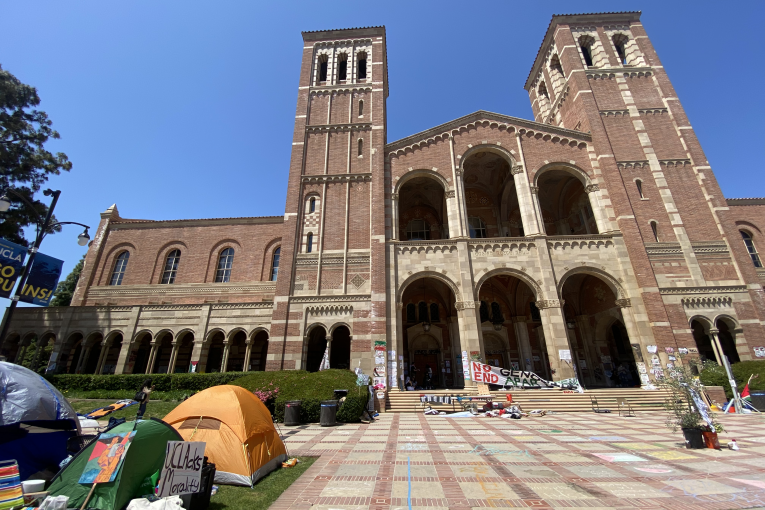

LOS ANGELES- On Thursday, May 23, UCLA police arrested an 18-year-old man who was suspected in connection with the violent attack on the Palestinian encampment on April 30 at the University of California, Los Angeles (UCLA). The arrest represents a major step forward in the continuing investigation into the campus dispute, which sparked intense criticism and resulted in changes to the university’s administrative structure.
UCLA police identified the suspect, Edan On, through video footage from the attacks and witness testimonies. He was detained in Beverly Hills and charged with suspicion of felony assault with a deadly weapon. He had been seen in many shared images and videos wearing a white hoodie and mask, where he was attacking protesters with a wooden pole. On is expected to appear in court on Tuesday and is presently detained in Los Angeles County jail on $30,000 bail.
This violent attack on April 30 began when masked counter-protesters disrupted the Palestinian encampment at UCLA. They used clubs, poles, fireworks, and pepper spray to attack the pro-Palestinan protests. Many have criticized UCLA for the lack of protection for the students and the heavy-handed dismantling of the encampment the following night.
Campus police intervened after the violence persisted for three hours, going into the early hours of May 1. Students, faculty, staff, and the governor’s office of California harshly criticized the campus police for their late reaction, labeling it “limited and delayed” and “unacceptable.”
When authorities forcefully removed the campsite the day following the violent altercation, 210 people were taken into custody. This move received criticism as well for being overly forceful, pointing to an apparent disparity in the police’s treatment of the two incidents.
Following the event, the Chief of Police at UCLA, John Thomas, was relieved of his duties and given a new assignment. To examine and enhance security procedures, the university developed a new Office of Campus Safety under the direction of Rick Braziel. The UCLA administration has been the subject of great scrutiny since Chancellor Gene Block testified before Congress over the way the institution handled the demonstrations.
During the congressional hearing, Block said, “With the benefit of hindsight, we should have been prepared to immediately remove the encampment if and when the safety of our community was put at risk.” He also emphasized UCLA’s continuous commitment to finding and holding those accountable who were involved in the violence on April 30.
During the Congressional hearing, Block faced criticism for his actions. Representative Ilhan Omar stated, “You, the UCLA leadership, and law enforcement stood by for hours as the mob of agitators gathered near the encampment with a clear intention to cause violence.” She questioned the university’s capability and reaction, voicing concerns about the safety of the students.
The university’s conduct toward the brutality sparked larger discussions on college campuses across the United States, where disputes among pro-Palestinian and pro-Israel groups have resulted in antisemitism and Islamophobia allegations. The UCLA incident happened soon after comparable demonstrations at Columbia University, and it was part of a national trend of student action on campuses connected to the continuing crisis in Gaza.
UCLA continues cooperating with the LAPD and other authorities to identify individuals involved in the violence. “The UCLA Police Department is committed to investigating all reported acts of violence and is actively working to identify the other perpetrators of violence associated with any protest or counter-protest activities,” the department reported in a statement.
At the university, the situation is still very tense. On May 23, before Edan On’s arrest was announced, students attempted to have another pro-Palestinain encampment. University officials quickly warned the protestors to disperse or face arrest and an order to stay away from campus for 7 days. The protestors complied, and no arrests were made.
The university’s response to the April 30 event and its following events remains a source of controversy. Some say that the administration and police failed to safeguard the students, allowing the circumstances to worsen unnecessarily. Others argue that the university’s efforts, while faulty, were limited by the difficulties of handling massive, emotionally charged protests.
The recent events at UCLA demonstrate the difficulties and complexities college campuses face in attempting to balance free speech, campus security, and protecting their communities during politically sensitive times. Individuals argue that the establishment of the Office of Campus Safety, as well as the continuing independent evaluation of the university’s reaction, represent positive strides forward. Yet, it is unclear if the institution will be able to properly handle these issues of free speech, the right to assemble, and the university’s ability to protect its students and faculty without bias.
Meanwhile, Edan On’s apprehension draws attention to the grave ramifications of the events on April 30. As the inquiry persists, UCLA faces a responsibility to show that it can maintain the law and protect its community while still honoring the fundamental liberties of peaceful protesters.